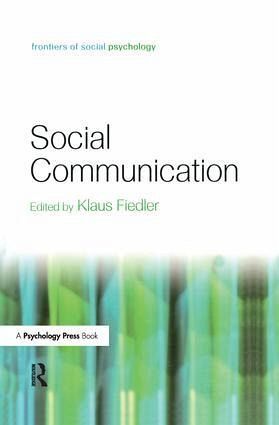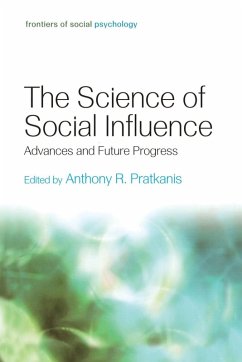
Social Communication

PAYBACK Punkte
30 °P sammeln!
This volume is devoted to the fascinating topic of social communication - fascinating because communication is ubiquitous, in that one cannot not communicate. And yet, the art of effective communication can be extremely demanding and elusive, because a tricky trade-off problem has to be solved. For communication to be successful, it must be at once informative - somehow indicating an intended direction of thought or action - as well as subtle - somehow concealing intentions and instrumental goals. Failure to meet the former criterion renders communication uncontrolled and haphazard; failure to...
This volume is devoted to the fascinating topic of social communication - fascinating because communication is ubiquitous, in that one cannot not communicate. And yet, the art of effective communication can be extremely demanding and elusive, because a tricky trade-off problem has to be solved. For communication to be successful, it must be at once informative - somehow indicating an intended direction of thought or action - as well as subtle - somehow concealing intentions and instrumental goals. Failure to meet the former criterion renders communication uncontrolled and haphazard; failure to meet the latter raises suspicion and reactance.
The chapters in this volume focus on the tools and repertoires evolved by social communication in order to deal with this demanding trade-off. They represent prominent paradigms of current research at the interface of communication and social psychology, presented by leading scholars who have played crucial roles in the developmentof those paradigms.
The sixteen chapters are grouped into four major sections: communication within and between groups and cultures; strategic communication; social communication, affect, and behaviour regulation; and social communication and adaptive behaviour regulation. Individual chapters are devoted to such intriguing topics as stereotypes and intergroup affairs, language and culture, deception and lie detection, persuasion, discussions in groups, logic of conversation, nonverbal cues, conversational implicatures, the impact of conversation situations and social distance, and the evolution of verbal communication. The volume is framed by an introduction and an epilog.
Social Communication is essential reading for senior undergraduates, graduates, and researchers working in the field of social communication, language and social psychology, and related areas in social science such as communication science, linguistics, and gender studies.
The chapters in this volume focus on the tools and repertoires evolved by social communication in order to deal with this demanding trade-off. They represent prominent paradigms of current research at the interface of communication and social psychology, presented by leading scholars who have played crucial roles in the developmentof those paradigms.
The sixteen chapters are grouped into four major sections: communication within and between groups and cultures; strategic communication; social communication, affect, and behaviour regulation; and social communication and adaptive behaviour regulation. Individual chapters are devoted to such intriguing topics as stereotypes and intergroup affairs, language and culture, deception and lie detection, persuasion, discussions in groups, logic of conversation, nonverbal cues, conversational implicatures, the impact of conversation situations and social distance, and the evolution of verbal communication. The volume is framed by an introduction and an epilog.
Social Communication is essential reading for senior undergraduates, graduates, and researchers working in the field of social communication, language and social psychology, and related areas in social science such as communication science, linguistics, and gender studies.














